When attempting to log into your computer with a Microsoft account, you may come across the error message “Your device is offline, try a different sign-in method” on the lock screen. This can happen even if you just turned on your PC.
This error or many similar errors can occur on a Windows PC due to multiple reasons. In this article, we are going to discuss all the reasons as well as the solutions you can apply to fix the issue and successfully sign into your computer account.
Table of Contents
Why is my Device Offline
You may see the following error messages that are similar in meaning, and possibly have the same solutions.
Your device is offline, try a different sign-in method
Your device is offline. Please sign-in with the last password used on this device
You'll need the Internet for this. It doesn't look like you're connected to the Internet. Check your connection and try again.
All of the aforementioned error messages suggest that your device is not connected to the internet, which is why the device is unable to communicate with the Microsoft servers, hence unable to log you in using a Microsoft account. However, there might be other reasons as well:
- Issues with the network adapter or network driver
- Misconfigured network settings
- Malfunctioning router
- Incorrect Microsoft credentials
- The Microsoft servers are down
If you are facing a similar issue, let us see how you can mitigate it and log into your account.
Fix Device is Offline Try a Different Sign-in Method
The methods below can be used to rectify any issues and successfully sign into your account. Note that some of the solutions given below can be applied on other devices that you can sign in on, while some need to be performed on the problematic computer.
In the cases where the solutions need to be performed on the same problematic device, you must sign into the PC using another account; preferably the local Administrator account. Here are a few guides that you can use to get into your local Administrator account:
- Enable, disable, or delete the built-in Administrator account
- How to log in as Administrator
- How to create an Administrator account
Alternatively, you may boot into safe mode and perform the tasks there. Booting into safe mode does not require any credentials and starts the Windows OS with minimal apps and background processes.
Check Internet Connection
On the lock screen, you cannot connect to a Wi-Fi network unless one is already added and saved to the list of Wi-Fi connections, and is in the vicinity. If you are working with Wi-Fi, we would suggest that you check whether it is connected or not.
In case you have an ethernet cable connected to your computer, unplug it and then plug it back in and secure it.
We would also suggest that you restart your router/modem in case the issue is at its end. A simple modem reboot often fixes issues with its processes and services.
Verify Microsoft Credentials
If you are using a Microsoft account to log into your computer account, and have not set up a PIN or a Windows Hello sign-in, you should double-check your sign-in credentials.
If entering the wrong credentials, instead of getting an “incorrect username or password” error, you may see the “Device is offline” error message instead.
Therefore, we suggest that you verify your Microsoft account credentials using these simple steps:
-
Go to www.hotmail.com and click Sign in.
-
Put in your account credentials and sign in.
-
If you are unable to sign in using the credentials, initiate the account recovery process and reset your account password.
If you can sign in, then your credentials are verified and correct. However, if you cannot, reset the password and then use the new credentials to attempt to sign into your computer account.
Check Microsoft Server Status
When you put in your Microsoft account credentials, an active internet connection is needed each time so that your computer can communicate with the respective Microsoft servers and authenticate the credentials. This would not be possible if the Microsoft servers themself were down at that point.
Click on the link above to check the status of the Microsoft servers. If all servers are up and running smoothly, you should see the “We’re all good! Everything is up and running” message.
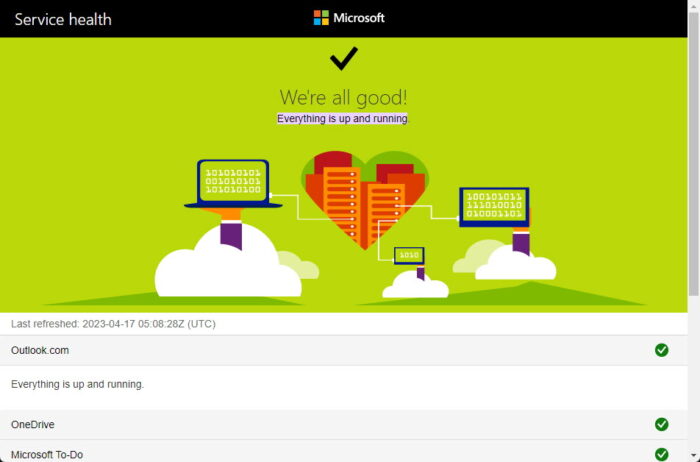
Reset Network Settings
Resetting the network on your computer reinstalls the network driver and brings all the configurations to their default settings. Use the following steps to reset the network driver:
-
Go to the following:
Settings app >> Network & internet >> Advanced network settings >> Network reset
-
Click “Reset now.”

Reset network -
Now click Yes to confirm the action.

Confirm network reset
The computer will now restart and the network settings will be reset. When it does, try logging back into your account using the Microsoft credentials and see if you are successful.
Reset TCP/IP Stack
The internet works on TCP/IP protocol. If TCP/IP protocol stack is not working correctly, you will have issues with your Internet connection, such as the one we are trying to fix. The best way to fix Internet issues is to reset TCP/IP stack settings. Follow these steps to learn how:
Note: Resetting your TCP/IP stack will undo any manual configurations. Therefore, it is recommended that you only proceed forward if you remember and can configure those settings again.
-
Now run the following cmdlets one after the other.
ipconfig /release ipconfig /flushdns netsh winsock reset netsh int ip reset ipconfig /renew -
When all these cmdlets are executed, restart your computer, re-apply the manual configurations (if any), and then attempt to connect to the network again.
Update Network Driver
Outdated or corrupted network drivers are often the cause of a faulty and unstable internet connection. It may be possible that you have either an old or a corrupted network driver installed which needs to be replaced to rectify the issue.
First, try to update your network driver to a newer, better version. However, if the latest version is already installed, then you must reinstall it. Here is how:
-
Open the Device Manager by typing in “devmgmt.msc” in the Run Command box.
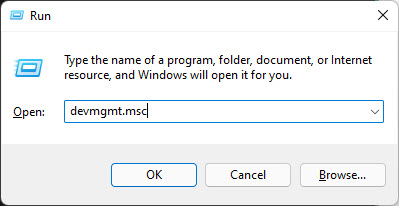
Open Device Manager -
Expand “Network adapters” by clicking on it, then right-click on the wireless adapter and then click “Update driver” from the context menu.
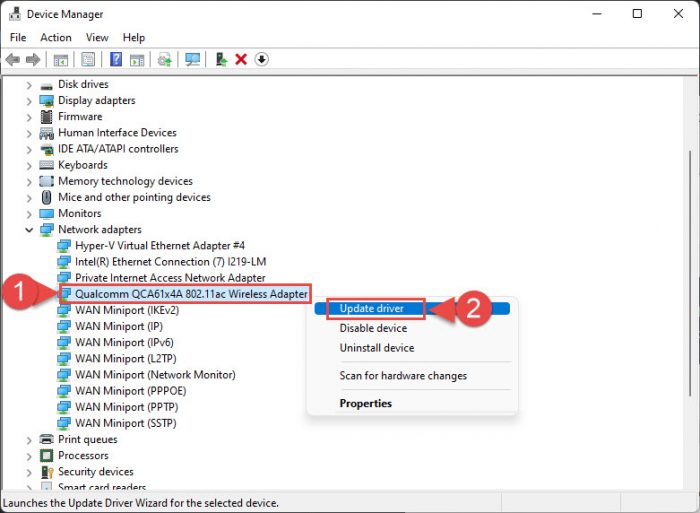
Update network driver -
You can now click “Search automatically for drivers” to automatically install the latest driver (needs internet connection), or you can click “Browse my computer for drivers” to manually update it if you have already downloaded a standalone driver for your network adapter.
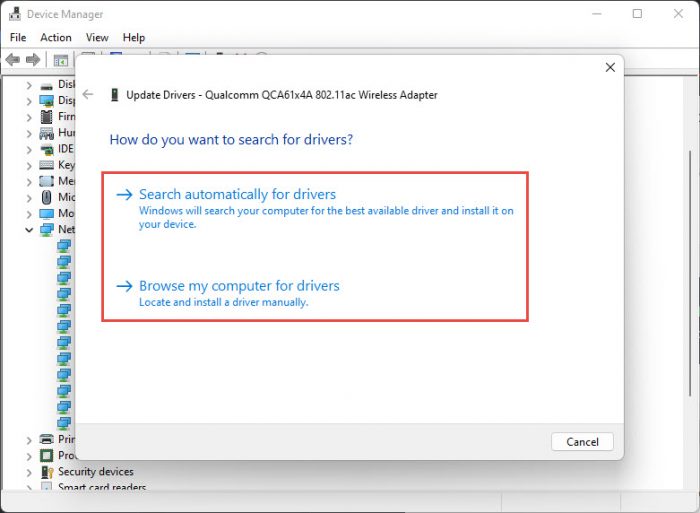
Choose how to update the network driver
Once the driver is updated, continue to check if you can now log into your account. However, if the latest driver was already installed and your problem remains, try reinstalling the driver.
Remove Microsoft Account from Windows Registry
When you create a Microsoft account on the computer, the values are stored in the Windows Registry. Faulty registry values and keys can cause issues with the account and prevent you from signing in. Therefore, you must remove the old Registry keys so that new, fresh ones can be created.
Note: Misconfiguration of critical values in the system’s registry could be fatal for your operating system. Therefore, we insist that you create a system restore point or a complete system image backup before proceeding forward with the process.
You can also use our top selection of disk imaging and backup software so you never lose your data or operating system again.
On the problematic PC, log in with an alternate administrative account and perform the following steps:
-
Open the Registry Editor by typing in “regedit” in the Run Command box.
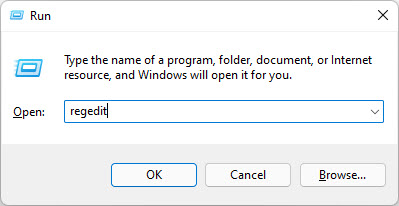
Open the Registry Editor -
Navigate to the following keys:
Computer\HKEY_USERS\.DEFAULT\Software\Microsoft\IdentityCRL\StoredIdentities

Go to the StoredIdentities Registry key -
Delete the Microsoft account key inside the StoredIdentities key by right-clicking it, and then click Delete from the context menu.

Delete the Microsoft account Registry key -
When asked for confirmation, click Yes, and then restart the computer.
-
Once the computer restarts, try logging in again using the Microsoft account credentials.
This concludes all the methods to fix the error message “Your device is offline, try a different sign-in method,” or any similar errors for that matter.
Closing Words
As mentioned earlier, the error words “your device is offline” do not necessarily mean that the issue has occurred because there is no internet. There can be other matters associated with the problem that may go away when addressed properly.
In this guide, we have discussed all the possible mitigation issues that will rectify the aforementioned error message so that you can log into your account.
